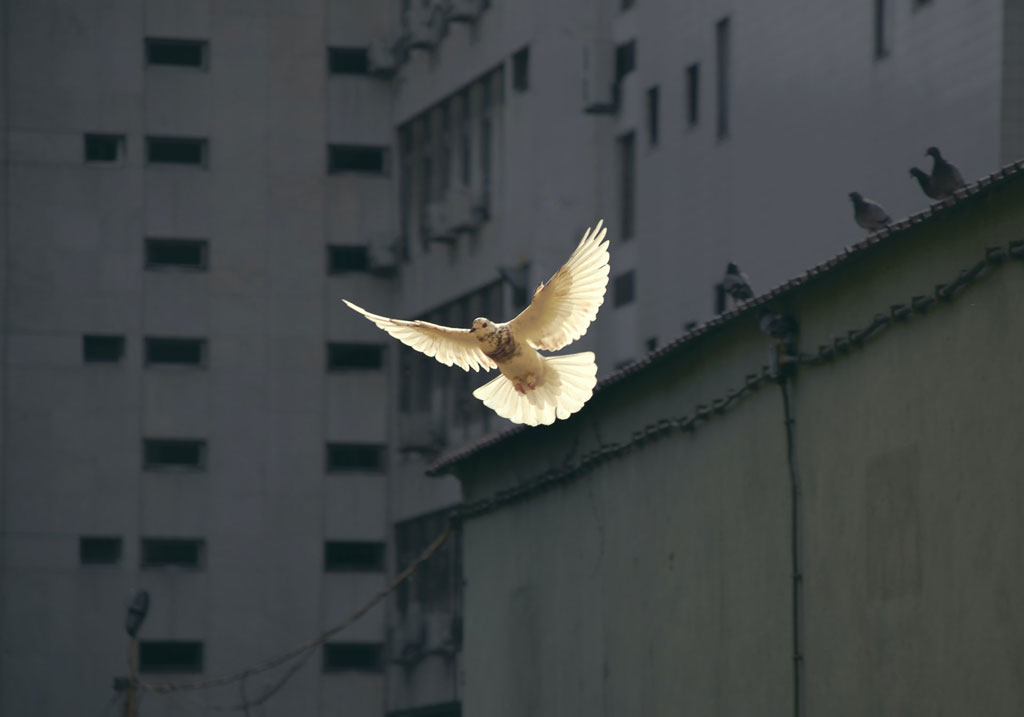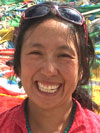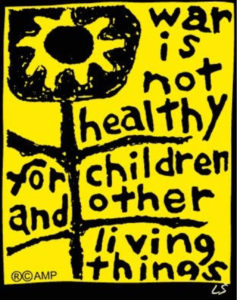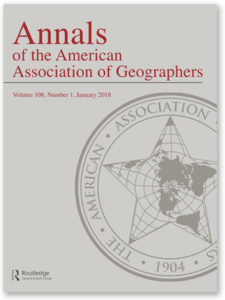War, Peace, and the Possibilities of a Shared Future


I was in middle school when The Day After aired on ABC. A depiction of the aftermath of nuclear conflict between NATO and the Soviet Union, the bleak film left me haunted by the question of whether there would be a future at all. The film horrified me not only with its representation of radiation poisoning as it painfully dismantled bodies, but also with how completely blasé everyone is leading up to the earth-rending explosions. Six years later, the Berlin Wall fell, and two years after that, the Soviet Union collapsed and the Cold War ended. Political scientist Francis Fukuyama famously declared in 1989 that we had arrived at “the end of history.” Noting “the fact that ‘peace’ seems to be breaking out in many regions of the world,” he argued that the world was witnessing not just the end of the Cold War but also “the end of history as such…the universalization of Western liberal democracy as the final form of human government.” How poorly this arrogant claim has aged.
As I write, Russian forces have illegally invaded Ukraine and bombed civilian targets, including a children’s hospital and a maternity ward. The unprovoked assault has caused more than 2.5 million Ukrainians to flee the country. Putin has also put nuclear forces on high alert, and appeared to threaten the use of nuclear weapons. Analysts worry about what will happen if Putin is backed into a corner, and still more, about the ease with which an accident could produce a nuclear crisis. Even without the deployment of such weapons, nuclear contamination risks are high, between the seizure of the defunct Chernobyl nuclear plant and its radioactive waste facilities, where workers have not been allowed to rotate off shift, and outside electric power has been lost; and the unprecedented attack on the Zaporizhzhia Nuclear Plant, the largest in Europe. Though the Bulletin of the Atomic Scientists has not moved the Doomsday Clock since January, it stands at 100 seconds to midnight, the closest it has ever been to apocalypse. Beyond the current atrocities, one of the most destabilizing effects of the invasion could be “a renewed global thirst for nuclear weapons as a means of protecting national sovereignty.” Cold War historian Mary Elise Sarotte writes, “Mr. Putin’s recklessness may cause the years between the Cold War and the Covid-19 pandemic to seem a halcyon period to future historians, compared with what came after. I fear we may find ourselves missing the old Cold War.”
* * * * *
Geographers have weighed in about the war, expressing solidarity with Ukraine. Some are also debating how to understand its causes. David Harvey’s intervention starts with the context of the militarization of the US economy during the Cold War and the devastating effects of neoliberal “shock therapy” on Russian political, cultural, and economic life after the breakup of the Soviet Union. Like many other analysts, Harvey focuses on NATO’s eastward expansion, against the verbal promises made to Gorbachev early on, a move that diplomat-historian George Kennan called back in 1997, “the most fateful error of American policy in the entire post-cold-war era.” Harvey also mentions the US-led NATO bombing of Belgrade in 1999, an event that Russian-American journalist Masha Gessen has observed is a pivotal reference for Putin (his invasion of Ukraine is, she suggests, like a “cosplay of Kosovo” for him). All of this, Harvey argues, added up to a disastrous humiliation of Russia, which is clearly at play in the official Russian state narrative.
Though much of this is uncontroversial, other aspects of Harvey’s essay have been taken to task. Derek Hall argues that Harvey’s exclusive focus on the West appears to absolve Putin and his authoritarian regime. Moreover, the essay fails to call the invasion what it is, and omits Russia’s other wars in Georgia (2008) and earlier in Ukraine (2014-15). Geographer Elizabeth Dunn calls out Harvey’s statement that “the Soviet Union was dismembered into independent republics without much popular consultation.” In fact, she says, there was “plenty of consultation with the people who mattered – the citizens of the countries formerly colonized by Russia who demanded the right to decide their own futures.” The populations of republics that declared independence saw this as a restoration of their previous national sovereignty. Thus, Dunn argues that Harvey’s anti- (Western) imperialist stance inadvertently morphs into a pro-imperialist support of Putin’s desire to restore the Russian empire. How to take an anti-Western imperialist stance that does not simply elide non-Western forms of imperialism wielded through the discursive tool of “national humiliation,” is a crucial and difficult question that must be carefully navigated in and beyond the post-Soviet world (i.e. China).
As part of the global condemnation of Vladimir Putin’s invasion and its increasingly indiscriminate attacks on civilians, the Executive Committee of the International Geographical Union (IGU) took the unprecedented step of suspending membership of the IGU National Committee of Russia, given its close association with the Russian Geographical Society, the Board of Trustees of which is chaired by Putin, and the president of which is the Minister of Defense. This was accompanied, however, by a recognition that many Russian geographers and other members of the academic community strongly object to the invasion. In fact, more than 1800 Russian geographers have signed on to an Open Letter to Vladimir Putin condemning the military aggression. One translation by Russian geographers can be found here. It reads, in part:
We, the citizens of the Russian Federation…are aware of our responsibility for the fate of our country, and thus, oppose the military operation on the territory of the sovereign state of Ukraine….We consider it immoral to remain silent now… War renders pointless all the long-term efforts of geographers and other experts to contribute to the well-being of society, preserve the natural environment, combat climate change, plan and pursue peaceful spatial development of the Russian and Ukrainian economies….War must be stopped immediately!
This is a brave declaration, especially considering the doublespeak Russian law enacted on March 5, according to which anyone calling what is happening a “war,” “invasion,” “aggression” or anything other than a “special military operation,” could be jailed for up to 15 years on the grounds of so-called “false information” or “fake news.” The Russian state’s complete stranglehold on news means that the vast majority of Russians are living in a through-the-looking-glass world in which Russia is merely performing ‘peacekeeping’ operations to “de-Nazify” Ukraine, and that any attempts to say otherwise simply confirm that the West’s goal is to humiliate Russia. Russian geographers want the world to know that they emphatically condemn the “war that must not be called a war.”
 The Open Letter observes that war renders pointless efforts to stop climate change and pursue well-being. The links between the war and the climate emergency are many: the war is being fueled by Russian oil and gas; expanding renewables and accelerating an energy transition is the only way to create true energy security. Wars obviously devastate the environment along with human lives, and militaries have contributed inordinately to climate change. But the emergency of war causes everything else to come to a standstill. As one Russian climate activist stated poignantly, “I cannot talk about climate in Russia anymore, because people are dying in Ukraine…we don’t have a future anymore in Russia, so I stopped my fight for future, and now we’re fighting for our present.” Masha Gessen, too, has observed that many Russians she knows, who are opposed to the war, have experienced “a kind of sudden and drastic descent into a sense of having no country, no place, and no sense of a future.”
The Open Letter observes that war renders pointless efforts to stop climate change and pursue well-being. The links between the war and the climate emergency are many: the war is being fueled by Russian oil and gas; expanding renewables and accelerating an energy transition is the only way to create true energy security. Wars obviously devastate the environment along with human lives, and militaries have contributed inordinately to climate change. But the emergency of war causes everything else to come to a standstill. As one Russian climate activist stated poignantly, “I cannot talk about climate in Russia anymore, because people are dying in Ukraine…we don’t have a future anymore in Russia, so I stopped my fight for future, and now we’re fighting for our present.” Masha Gessen, too, has observed that many Russians she knows, who are opposed to the war, have experienced “a kind of sudden and drastic descent into a sense of having no country, no place, and no sense of a future.”
* * * * *
The world’s attention is understandably riveted upon Ukraine. But as geographers, we think about the interconnectedness of places, and we have a responsibility to remind our communities, our publics, of this fundamental relationality. Ukraine has been called “Putin’s Afghanistan,” a potentially useful analogy, but not if it obscures the ongoing humanitarian catastrophe in Afghanistan itself. After its withdrawal, the US froze Afghan Central Bank assets held in the US – much of it consisting of the savings of ordinary Afghans – causing workers to go without paychecks, and a rapid economic collapse. In February, the Biden Administration announced it would split the 7 billion USD in frozen assets, half for humanitarian relief and half for families of 9/11 victims; some have pushed back against this effective theft of Afghan assets, as well as the misunderstanding that it is Taliban money. Currently, over half the population, including 5 million children, are at risk of starvation. The Ukraine war has caused soaring wheat prices, which could further multiply the impact of famine. The people are squeezed between the Taliban on the one hand, which has prohibited Afghans from leaving, and hunted and disappeared those known to have worked with foreigners; and utter economic devastation and food insecurity on the other. More civilians may die from ongoing sanctions than from 20 years of war.
Fridays for Future summed it up well in a recent tweet: “While Ukrainians deserve immediate peace and all of our support, so do the people from Afghanistan, Libya, Syria, Yemen, and all war-torn regions. Empathy, justice, and compassion should be for everyone. Refugees should not have to be white to be heard and seen.” Contra Fukuyama, peace cannot just be left to “break out.” Peace is not just the absence of war. Rather, it is a process, one that will require a great deal of hard and yet necessary work of grappling with responsibility and with the wounds of the past and present. Without it, none of us will have a future.
Please note: The ideas expressed in the AAG President’s column are not necessarily the views of the AAG as a whole. This column is traditionally a space in which the president may talk about their views or focus during their tenure as president of AAG, or spotlight their areas of professional work. Please feel free to email the president directly at emily [dot] yeh [at] colorado [dot] edu to enable a constructive discussion.

